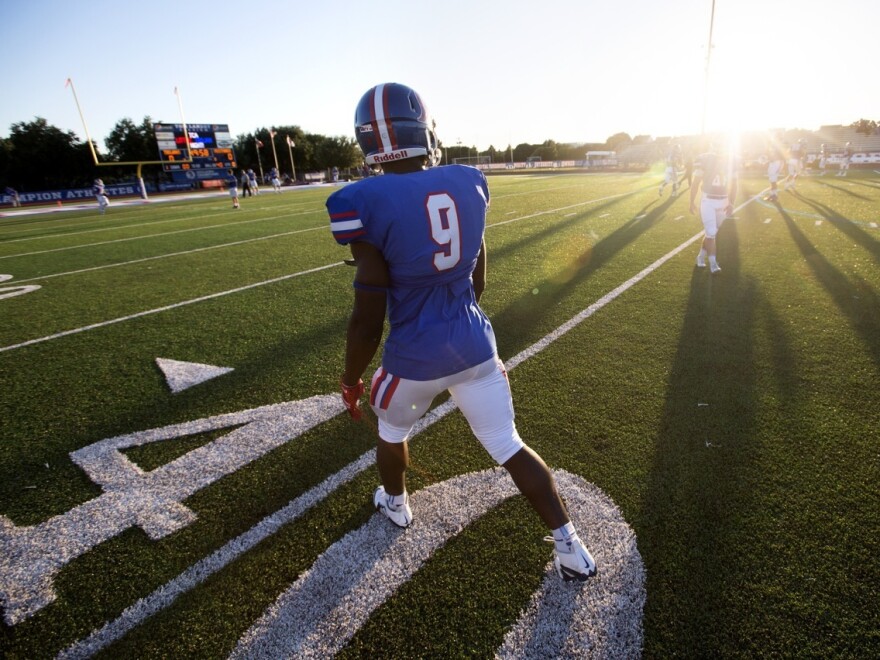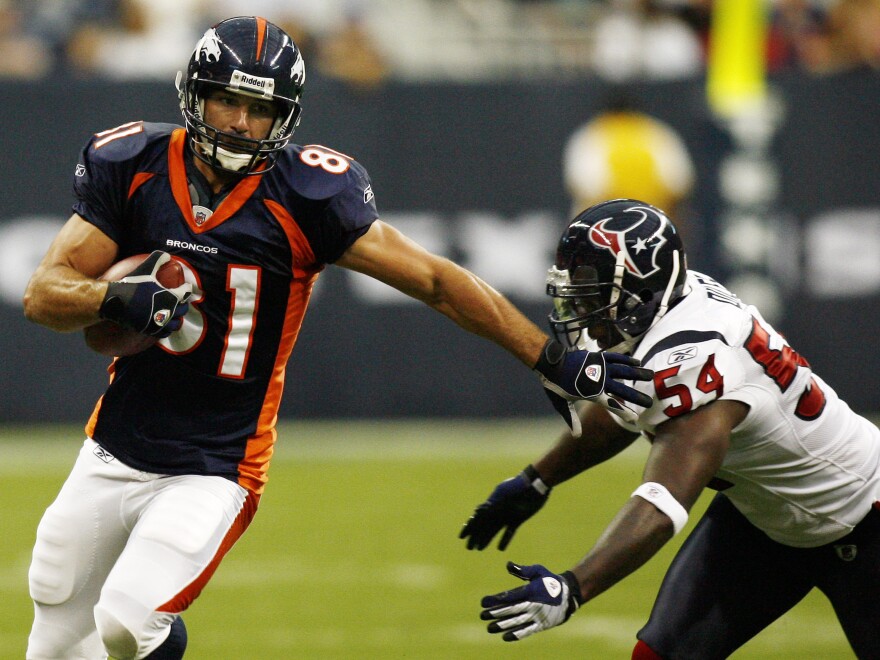This September alone, three high school football players died after injuries sustained on the field. The latest, a 17-year-old quarterback from New Jersey, suffered a ruptured spleen during a game just over a week ago.
In some high schools across the U.S., deaths such as these — and an increased focus on the risk of head injury and concussions — have raised concerns among parents and diminished interest in the sport. At others, like the Maplewood Richmond Heights High School in suburban St. Louis, the football programs have disbanded altogether.
Earlier this year, at a live event in Dallas, NPR's Michel Martin discussed the ethics of football with two longtime players — one retired from the NFL, the other just beginning college. Nate Jackson, who played six seasons in the NFL, and Nahshon Ellerbe, a former high school football star now at Rice University, joined Martin again this week to resume the conversation on All Things Considered.
"For people who haven't played the sport before, it's hard to explain to them why you would subject your body to that kind of stress and turmoil," Ellerbe tells her. "But for people who play the game and love it, it's pretty simple."
But complexities remain.
To hear the full interview, listen to the audio link above.

Interview Highlights
On a dangerous incident from Jackson's high school football days
Jackson: I had a scrimmage when I was a senior, and the quarterback for the other team was scrambling. He got held up on his legs and spun around, and our linebacker hit him right in the face mask with such force that it popped the straps off his chin strap and pushed his face mask from his nose and split his lip from his nose down and basically exposed his teeth. He was spitting out blood, and I was standing right over him.
It was a sobering moment, definitely. But the urgency of a football game — you know it's a next-man-up mentality, and we just kept on going. Once they got him off the field, got him in an ambulance and drove him away, we looked at each other and shook it off and then we were right back off there playing again. So, for me, that was a good introduction to the machine that just keeps on rolling. It doesn't stop. ...
I was in high school and I had aspirations to continuing playing. You know, you just hope it's not you, and when it happens to a friend or an opponent, you feel bad for them, but the moment sweeps you right up back in it and you forget about it very quickly.
On why Ellerbe keeps playing football, even knowing that people can get badly hurt
Ellerbe: I think definitely the reward of playing football, and the experience you have, just kind of outweighs any type of fear that you may have. Because my teammates that I've seen sustained major injuries — I never sustained one, thankfully — but the ones I've seen sustain major injuries, you know, they are some of the hardest-working and passionate players that I've ever been around.
So, football is a game just full of passion, and we as high school football players, as college football players, we come to the game knowing that there are risks. But really, quite honestly, if you ask any player, they'll probably tell you they don't really care because they love the game. And they love having teammates, and they love that atmosphere.
On why it might be that the three deaths recently all occurred at the high school level
Jackson: I think because the disparity in skill levels, sometimes, on a high school field is pretty vast compared to college and especially the NFL. In the NFL, all these guys are really the cream of the crop, the strongest, fastest, most stable guys of the bunch, and the lower you go down, you know, you'll have guys on a football field in high school who might not belong there.
That's kind of part of the cultural funneling system that puts all boys on a football field. Not all boys are cut out to play football. Me and Nahshon are, but some of these high school kids get put on compromising positions on the field and end up taking a shot from a guy who's much bigger, much faster, much stronger. And his body just can't withstand it.
Also, the medical treatment that's received, the medical officials that are on site in the NFL and college, you know, they have more resources at their fingertips, whereas at these high schools, they can be stretched pretty thin, as far as the medical training of the people involved or the ability for them to get to the hospital fast.
On what Jackson would recommend, to make the sport safer
Jackson: I think it's about coaching, really. It's the coaches taking a step back and looking at the well-being of the kids.
I think football did a lot of great things for me. I feel like I left the game with my mind intact, and it gave me a lot of great opportunities. I wouldn't go back and change anything I did, and I don't think Nahshon would either — and all the guys I played with in the NFL will tell you the exact same thing.
But I think it's the culture around the game — not so much the players themselves, but in amateur football, the adults that funnel them on the field, that mow the lawn, that make the helmets, that set the broken arm (if you break your arm), that take you to the hospital, that allow you to pass classes maybe when you didn't deserve it. Those are the people who need to ask themselves what they are creating by allowing this game to exist and putting it on such a pedestal.
The thing about it is, you know, we believe that football is a very, very important event, and that's why we'll sacrifice our lives for it. It's a proving ground for manhood. And everybody in your community, wherever you are in America, and every high school — they rally around the football team, and it's the central point of all the energy and the school pride, and so there's so much momentum around it.
I don't know how you pull that back, because the NFL is a hype machine, you know. So they're selling this product, and it trickles down. And all the kids watch it, and they want to be there, too.

On whether Ellerbe has heard conversations — with teammates, parents or coaches — changing around the sport
Ellerbe: I definitely think the measures that we take to protect ourselves are definitely changed, It's kind of crazy how innovations have taken place, and how much more protection and how much knowledge we have now.
But I will say, I think a big difference is that there's so many player protections, drill work, practice layouts, game days, sideline procedures that aren't used in high school that are standard in college and professional football — things like that, where we discuss in college locker rooms, "OK, thank God we have those things now; we didn't have those things in high schools."
So I think there are certain ways to protect ourselves certain ways, to be smarter. Coaching is extremely important. Just knowing the correct way to tackle — if you don't know that, you put yourself at huge risk of getting hurt every time you step on the field.
But, you know, in the locker room we are not all that concerned about injuries. Obviously, when someone does get injured, we rally around them and we help them get back to full strength. But we don't talk about it. It's just kind of taboo. We just work hard, put our heads down and keep going because it's the game we love, and it's the game that we've been playing for so long.
Copyright 2021 NPR. To see more, visit https://www.npr.org.


